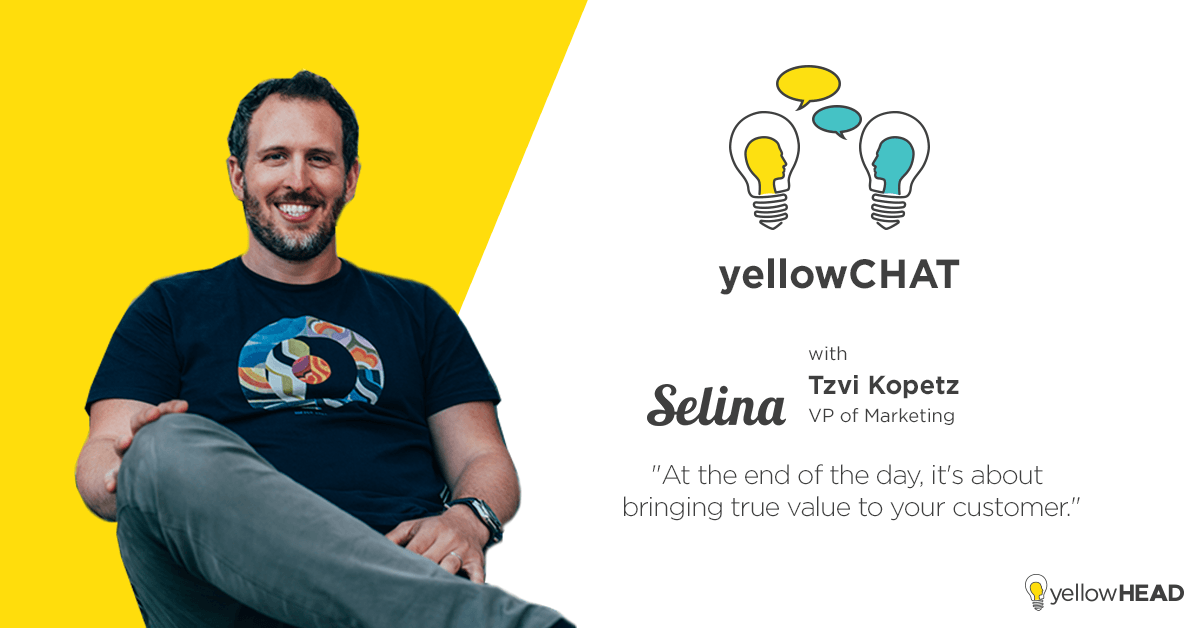Tzvi Kopetz is Elevating Selina’s Digital Marketing & Taking Travel to New Heights
Tzvi Kopetz is an entrepreneur and the VP of Marketing for Selina, an exciting hospitality company that provides unique experiences to digital nomads.
Or as Tzvi likes to put it: Selina is a startup on steroids in the lifestyle, travel and hospitality space.
So, What’s Selina’s Mission?
To connect people in the most authentic way possible – through curating physical locations around the world and converting them into inspiring places.
Over the past few years, Tzvi says that millennials’ anxiety levels have increased dramatically due to the digital transformation. Selina caters to the millennials that have the desire to escape their screens.
The startup was founded by two Israeli men in Panama who had a lot of experience in the real estate industry. Their combined backgrounds laid the foundation for creating Selina.
With a presence in Central America, South America, USA and Europe, Selina is boasting 15 locations with more on the horizon.
Traditionally in the hospitality industry, about 80%-90% of the revenue goes to accommodations, whereas it is only 55% for Selina. The rest is attributed to the content – the experiences – which they provide.
Selina offers a wide variety of activities, tours, transportation, events, classes, food & beverages, and overall wellness. They don’t just provide somewhere for you to sleep.
They provide the whole experience you’ve been looking for.
A Bit About the Man
Although he has a Mechanical Engineering background, Tzvi knew he didn’t want to be an engineer and started his online career right after university. Later, he went on to do his MBA.
He gave it a shot in the family business (an importing company in Israel), but was drawn to technology. Determined to make it, Tzvi dove headfirst into the online world.
His entrepreneurial mindset led him to found three companies, one after the other. At the beginning, he did it all: product, marketing, management, business development, sales, everything.
His first venture was a dev shop, which merged to another company.
Second was a B2B game developer platform. Eventually, Tzvi decided it was best to close shop on the project and move onto his next endeavor.
His third attempt was a startup where he learned from previous mistakes and did things right. The business was successfully sold after two years.
After some time as a general manager at a growing start-up, Tzvi found himself at Selina.
With his previous roles centered around business development & product, Selina’s tech division was a nice change of pace. The team focused on retention, marketing, and data analysis.
Selina had shifted and a new opportunity arose for Tzvi: VP of Marketing.
What are some of the main components of your marketing mix? What channels are you guys utilizing?
The travel industry is basically saturated when it comes to digital marketing.
There are so many travel companies out there, and so many ways to book a flight or a hotel today.
Throughout the years, a thing called “OTA” (Online Travel Agent) began to grow, such as Booking.com, Expedia, Airbnb. These platforms control the lower funnel of digital marketing in travel. That means if you search for almost any hotel in the world, Booking.com (for example) would be the first result as a sponsored result.
They are the biggest clients across all platforms. For Google, they spend approximately $4.5 billion a year. They are one of the biggest clients for Facebook as well, so you can imagine trying to compete with them. They look at the customer over a Lifetime Value retention period – they’re looking at this person for over 10 years.
When you look at the customer for that long, you can bid higher, you can calculate exactly how much you want to bid, and that can give us some trouble.
That’s why if we were an ordinary hotel, we probably wouldn’t have a digital marketing department and we would probably work with OTAs, distribution channels, and agencies.
For Selina, our platforms are still the main ones (Google and Facebook). When it comes to digital marketing & acquisition, our strategy is, basically, trying to take the 50% that is not attributed to accommodations and trying to build our brand through experiences and the content we provide our customers.
It’s more about finding and allowing our guests to discover experiences, because people are always looking for new experiences of things to do. And through that, try to convert them into staying guests.
That’s one angle, and the second one is retention. Retention is huge, huge, huge! We will get a person for their first night with an OTA, but then we’ll take that guest and try to convert them into our own channels (either web or through the app).
Was there anything that surprised you along the way?
I can tell you in terms of surprises: a big portion of our guests are extending their stay during their stay.
Now, instead of doing it through Selina’s website, app, or the front desk, they are in their rooms booking it through the OTA.
And when they do that, we pay commissions.
So, they’re already on our property, and they’re using a third-party or indirect channel to make that booking. That’s something that we were surprised by and we’ll try to fix because this is kind of a low-hanging fruit.
We have two tiers: acquisition & retention.
The retention side basically focuses on the user journey for all the people who came via an OTA. Through the data we’re seeing, we consider them likely to extend their stay.
We turn to these people with either emails and/or push notifications. We use on-site marketing as well, such as QR codes on their keycards, at the check-in, and with our trained our staff as well.
But what kind of advice would you give someone looking for a mobile marketing vendor?
That’s a tough question because we are transitioning from outsourcing to in-house, so we are bill-deducting internally.
We did use an agency. Why were we using it? Just to jump-start the marketing in Selina, while we did not have the right people in-house.
However, what has worked really well for us in working with an agency was defining a very simple and clear KPI.
For us, it was ROAS (Return on Ad Spend) and we compared it to the OTA. We gave a simple reason for why we’re looking for a high return, which was: Let’s say if you’re the agency, your biggest competitor, your replacement in life, is the OTA. I don’t need you; I have the OTA. They can fill my beds easily.
I pay them anywhere between 17-20% commission. That means their ad spend would be about 5x return.
In order for me to work with you, I need a higher return. We’re looking at 10x return because there’s also the agency fee, and that’s kind of how we rationalize the KPI.
The KPI (the ROAS) is how we rationalize the benchmark, the level that we’re expecting.
So that’s one guideline.
The second thing I would say is communication, communication, communication!
I have to be able to measure them by their responses to emails and their ability to have weekly meetings to make sure that everyone is in sync.
These are the two top tips that I have for working with agencies.
As for vetting them, the process was pretty simple. We looked at a few agencies and told them, “Go look into travel, understand travel, and tell us why we should work with you on travel. Describe the challenges. Show us how you are going to overcome them.”
Let them do the research, and not just try to sell me on why they’re the best.
What’s something about yourself that doesn’t tend to come up in professional circles?
I surf, which is fun.
Usually, I’m a pretty open and straightforward kind of guy, so my professional side and personal side are very, very similar. If you work with me here in the office, you will probably know my personal side as well.
Sports has always been a big part of my life. I was a professional judoka from 6-years-old until twenty-two. I was Ariel Ze’evi’s training partner in the 2004 Olympics. He took third place in that Olympics for Judo and was one of the few who won a medal for Israel. I was there with the whole team and behind the scenes.
That was an amazing experience.
I did go out and dance on the bar the other night. Literally on the bar. I have a two-month-old daughter, so no more dancing on bars now. Two months of not leaving the house probably did its thing.
Selina found a continually growing niche market with digital nomads. Where do you see the travel booking sites industry heading over the next five years in this very digital-driven world?
I genuinely believe that OTAs will always be big and keep growing. But brands that provide right content and value for customers will also become big.
There will be these unicorns. There will be very specific brands that you will go to in order to make a booking.
Loyalty to a brand will become stronger because, if we are booking through an OTA, it’s basically zero loyalty to a brand. If you are booking at the Hilton, at the Marriott, or wherever through an OTA, there’s usually zero loyalty points. It means you are not loyal to that brand.
What is your golden tip?
I’m not sure if anyone’s said this yet, but that’s because it’s obvious… it’s also the right one, which makes it the hardest one: Just be relevant.
Be relevant for the customer at any given point.
If I would have been able to create millions of added-values to millions of customers at millions of touch points, I would. I think that would be your way to win it, to make it. Obviously that’s not scalable so I am choosing my strongest USPs with large, relevant audiences and markets.
Eventually, it’s just being relevant. Relevant at the right time, at the right point, for the right customer.
It’s not about the sales, the percentages, the flashy banners. Sure, those help. But, at the end of the day, it’s about bringing true value to your customer.


